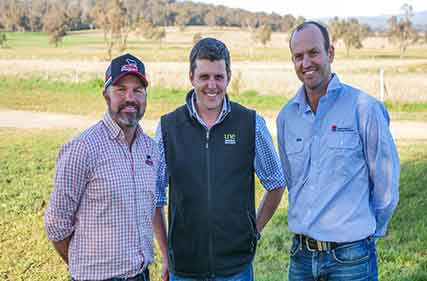 The Australian beef industry has launched a collaborative effort in a $15 million research project to examine the genetics of methane emissions in beef cattle.
The Australian beef industry has launched a collaborative effort in a $15 million research project to examine the genetics of methane emissions in beef cattle.
The research is being led by the University of New England (UNE), with Angus Australia being a key collaborator, along with the NSW Government and Meat and Livestock Australia (MLA).
The project aims to deliver decision making tools to identify cattle with genetic advantages for high productivity and low greenhouse gas impact.
It will focus on compiling existing and creating new data on beef cattle methane emissions, measured specifically for genetic evaluation, with the aim to generate methane emission research breeding values.
With the Australian red meat industry committing to a net zero emissions target by 2030, breeding for low methane emissions is an attractive strategy due to it’s potential to deliver cumulative and permanent change in the national beef herd over generations.
The research will also investigate how methane output interacts with profit-driving traits such as growth rate, fertility, feed intake, carcass weight and quality.
Angus Australia’s General Manager – Genetic Improvement, Christian Duff said the project will support the industry to breed cattle that are profitable for the supply chain, while meeting the environmental expectations of global consumers.
“Angus Australia’s commitment to this cutting-edge collaborative project, shows how our organisation and members, Angus beef cattle farmers, will be part of the solution to develop tools to reduce methane emissions of livestock.
Through this, we can contribute to the goals and expectations of government, industry and, most importantly, the beef consumer, which will be paramount going into the future.”
Livestock emissions will be measured using world-class technology which records the amount of carbon dioxide and methane in an animal’s breath as they eat an attractant. This technology will be installed at key beef cattle R&D locations including The University of New England’s Tullimba feedlot, where most of the Angus Sire Benchmarking Program (ASBP) bred steers are fed and tested for feed intake.
Specifically, the project is aiming to record methane emission data on 2,000 Angus Steers from the ASBP, from Cohort 11 to Cohort 15. Combined with other industry projects, methane emissions data will be captured on over 8,000 Australian beef animals.
“Through the project findings, Angus Australia hopes that our members, and the broader beef industry, will soon be in a position to consider including selection for lower methane emissions in their overall breeding objective,” said Mr Duff.
The Low Methane Beef project is being led by Dr Sam Clark, Associate Professor in Animal Genetics, University of New England, Armidale.
Dr Clark said the University of New England is fully committed to this collaborative project, including procurement and installation of the technology to measure methane emissions.
